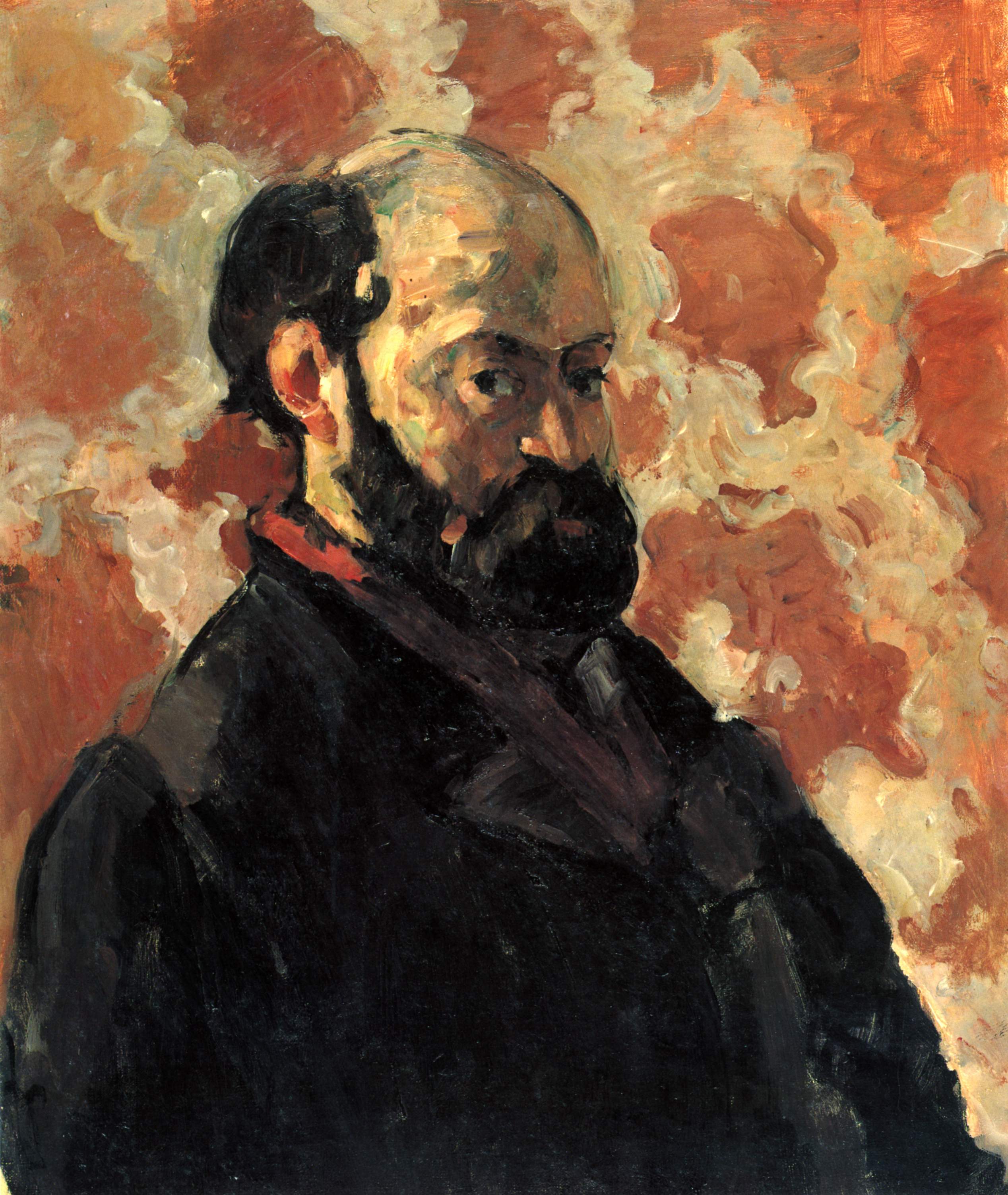Quote from Cézanne's letter to Émile Bernard, 23 October 1905; as quoted in Letters of the great artists – from Blake to Pollock, Richard Friedenthal, Thames and Hudson, London, 1963, p. 180
Quotes of Paul Cezanne, after 1900
Paul Cézanne: Zitate auf Englisch
Quelle: Quotes of Paul Cezanne, after 1900, Cézanne, - a Memoir with Conversations, (1897 - 1906), p. 164, in: 'What he told me – I. The motif'
Quote in Cézanne's letter to his friend Emile Zola, Aix-en-Provence, 14 April 1878; as quoted in Letters of the great artists – from Blake to Pollock"', Richard Friedenthal, Thames and Hudson, London, 1963, pp. 178-179
Quotes of Paul Cezanne, 1860s - 1870s
Quote from a conversation with Vollard, in the studio of Cézanne, in Aix, 1896; as quoted in Cezanne, by Ambroise Vollard, Dover publications Inc. New York, 1984, p. 67
Quotes of Paul Cezanne, 1880s - 1890s
Quelle: Quotes of Paul Cezanne, after 1900, Cézanne, - a Memoir with Conversations, (1897 - 1906), p. 155, in: 'What he told me – I. The motif': Cited in: George Pattison. God and Being: An Enquiry, (2011). p. 64
Camille Pissarro was Cézanne's 'teacher' in impressionistic landscape painting; they frequently painted together in open air.
Quelle: Quotes of Paul Cezanne, after 1900, Cézanne, - a Memoir with Conversations, (1897 - 1906), p. 164, in: 'What he told me – I. The motif'
one week later Cezanne died
Quote in Cezanne's last letter to his son Paul, Aix, 15 October 1906; as quoted in Cézanne, Ambroise Vollard, Dover publications Inc. New York, 1984, p. 112
Quotes of Paul Cezanne, after 1900
Quote in a conversation with Vollard in museum The Luxembourg, Paris 1897 - standing before the 'Olympia' of Manet; as quoted in Cézanne, by Ambroise Vollard, Dover publications Inc. New York, 1984, p. 36
Quotes of Paul Cezanne, 1880s - 1890s
remark of Cezanne ca. 1860
Quote in: Cézanne, by Ambroise Vollard, Dover publications Inc. New York, 1984, p. 28
Quotes of Paul Cezanne, 1860s - 1870s
Quelle: Quotes of Paul Cezanne, after 1900, Cézanne, - a Memoir with Conversations, (1897 - 1906), p. 160, in: 'What he told me – I. The motif
Quote from Cézanne's letter to Émile Bernard, 15 April 1904; as quoted in Letters of the great artists – from Blake to Pollock, Richard Friedenthal, Thames and Hudson, London, 1963, p. 180
Quotes of Paul Cezanne, after 1900
Quelle: Quotes of Paul Cezanne, after 1900, Cézanne, - a Memoir with Conversations, (1897 - 1906), p. 162, in: 'What he told me – I. The motif'
Quote from Renoir – his life and work, Francois Fosca; Book Club Associates /Thames and Hudson Ltd, London 1975, p. 79
Quotes of Paul Cezanne, 1880s - 1890s
Quote in a conversation with Vollard, along the river near Aix, 1896; as quoted in Cezanne, by Ambroise Vollard, Dover publications Inc. New York, 1984, p. 74
Quotes of Paul Cezanne, 1880s - 1890s
Quelle: Quotes of Paul Cezanne, after 1900, Cézanne, - a Memoir with Conversations, (1897 - 1906), p. 222 in: 'What he told me – III. The Studio'
Quelle: Quotes of Paul Cezanne, after 1900, Cézanne, - a Memoir with Conversations, (1897 - 1906), p. 119 (note 2), in: 'Fumées dans la campagne', Edmond Jaloux
Quelle: Quotes of Paul Cezanne, after 1900, Cézanne, - a Memoir with Conversations, (1897 - 1906), pp. 163-164, in: 'What he told me – I. The motif'
Quote from Cézanne's letter to Émile Bernard, 23 December 1904; as quoted in Letters of the great artists – from Blake to Pollock, Richard Friedenthal, Thames and Hudson, London, 1963, p. 184
Quotes of Paul Cezanne, after 1900
Quote of Cezanne, from his letter to Emile Zola, ca 1861; as quoted in Cezanne, by Ambroise Vollard, Dover publications Inc. New York, 1984, p. 23
Quotes of Paul Cezanne, 1860s - 1870s
Quote from Cézanne's letter to Vollard - Aix, 9 January, 1903; as quoted in Cezanne, by Ambroise Vollard, Dover publications Inc. New York, 1984, p. 103
Quotes of Paul Cezanne, after 1900
Quelle: Quotes of Paul Cezanne, after 1900, Cézanne, - a Memoir with Conversations, (1897 - 1906), pp. 184-185 in: 'What he told me – II. The Louvre'
Quelle: Quotes of Paul Cezanne, after 1900, Cézanne, - a Memoir with Conversations, (1897 - 1906), p. 221 in: 'What he told me – III. The Studio'
Quote in Cezanne's letter to his father in Aix; ca. 1871-73; as quoted in Cézanne, by Ambroise Vollard, Dover publications Inc. New York, 1984, pp. 33-34
Quotes of Paul Cezanne, 1860s - 1870s
Quelle: Quotes of Paul Cezanne, after 1900, Cézanne, - a Memoir with Conversations, (1897 - 1906), p. 151, in: 'What he told me – I. The motif'
Quote of 1906 from a letter; cited in Paul Cézanne, Letters ed. John Rewald, New York, Da Capro Press, 1995, p. 313
Quotes of Paul Cezanne, after 1900
Quelle: Quotes of Paul Cezanne, after 1900, Cézanne, - a Memoir with Conversations, (1897 - 1906), p. 211 in: 'What he told me – III. The Studio'
in the last conversation Vollard had with Cezanne
Quote in a conversation in Cezanne's studio in Aix, End of 1905; as quoted in Cézanne, Ambroise Vollard, Dover publications Inc. New York, 1984, p. 112
Quotes of Paul Cezanne, after 1900
Quelle: Quotes of Paul Cezanne, after 1900, Cézanne, - a Memoir with Conversations, (1897 - 1906), p. 124, in: 'What I know or have seen of his life'
Cezanne is referring in this quote to a photo of the painting 'Olypmpia', painted by Manet
Quelle: Quotes of Paul Cezanne, after 1900, Cézanne, - a Memoir with Conversations, (1897 - 1906), p. 71, in: 'What I know or have seen of his life'
“He (the painter Manet) hits of the tone.... but his work lacks unity and temperament too.”
ca. 1863
Quote in: Cézanne, by Ambroise Vollard, Dover publications Inc. New York, 1984, p. 27
Quotes of Paul Cezanne, 1860s - 1870s
